
When I analyze book and movie plots, I can get very clean and structured. This is the crisis, that over there is the climax, and this other thing, it’s the resolution.
But when I’m actually in the midst of the writing? I have no clue. Once I’m done, then I can look at what I’ve done, and see where the various pieces fall, but in the midst of the writing–I suppose it’s that I’ve internalized it so well I don’t have to consciously think about it, or something. Because I haven’t ever forgotten any of the pieces, so far, anyway.
Every story has a black moment–that moment when all seems lost, the bad guys are going to win, and nothing will ever be right again. I don’t care what kind of story it is, there will be a black moment. Little Red Riding Hood has a black moment (“All the better to EAT you with!”). The Wizard of Oz has a black moment (the wizard’s hot air balloon leaves without Dorothy). Sweet romances and women’s fiction and urban fantasies and every story has a black moment that sets up the climax–the point where the story begins rolling downhill to the resolution of all the conflict.
Each black moment, with its attendant climax, resolution and denouement, suits its own story. All together, these things create the conclusion of the story. The ending. Each thing has its own part to play. I have written endings that were 3 pages long, and I have written endings that were several chapters. Because I write adventure stories–romance or not–I tend to write big “grand finale” type endings. (I have a picture of an airplane on this post, because there are airplanes like that one in the current story.) There’s usually a big final confrontation with the bad guy that coincides with the black moment and all the rest. I often stick in my characters’ “dark night of the soul” and their “moment of realization” into the middle of this big battle/what-have-you. (Sometimes it’s a battle, sometimes it’s sneaking around, sometimes it’s hand-to-hand combat or a rescue.)
I am in the midst of the “grand finale” of the current book. I’m not sure I’ve quite reached the blackest of the black moments yet–just the kickoff one. Things will get blacker yet. This particular story is a big, sprawling adventure and needs a big sprawling ending. I really don’t want to rush it, and yet, I can’t drag things out either. But, it’s partly why I need this 100 words a day to get through it. There’s a lot to it. Lots of action. Lots of emotion. Lots of character turmoil.
So, there you have it. Adventure stories need adventurous endings. Romantic stories need romantic endings (you can have the romance in the adventure–or at least the “thinking about romance”). Emotional stories need emotional endings. Quiet stories need quiet endings. If they’re quiet and romantic, then both those things need to be there. In this book, I have to have adventure, and romance, and emotion, and…
Huh. Didn’t realize I was doing all that. I’d rather not think about it. It will scare me into not writing again.
Yeah, I’m on Day 9 of the writing. Go me!
]]>
You write a book the same way you eat an elephant. One bite–one bit–at a time. It’s a long hard slog. (Okay, an elephant reading a book doesn’t have anything to do with eating or writing, but it is an elephant, and a book…)
I was going to say it’s probably a good thing that stories aren’t exactly like elephants, because a whole elephant would go bad before one person could eat the whole thing. (Not that I can imagine one person actually trying… A whole tribe of people, maybe…) Except, it’s entirely possible that stories might rot a little before one finishes writing it. Or go stale, anyway. Still, that’s not my point here. We don’t want to stretch that metaphor right out of shape.
The point is that when you take on a task that is going to take a while, you just have to keep doing the next thing. Keep writing the next words. And the next ones, and the next ones.
I have fallen out of practice of doing the writing First, and I need to get back into it. If not First, then Whenever I Can.
And in pursuit of that, I have joined a “100 words” loop. The goal of this loop, generally, is to write 100 words every day for 100 days, no excuses, no exceptions.
There are some members who have slightly different goals–one is writing 300 words a day, with weekends off. (This will put her ahead of the 700 words a week pace…) One of the main rules is that, if you get More than 100 words, you can’t say so. Just say that you got your words for that day. That way it doesn’t turn into a competition, or something for someone to beat themselves up over. Oh, and if you miss a day–you have to start over with Day 1.
One of the members, Kay Hudson, has made it up to Day 300-something. Or maybe 400-something. She’s now burning up the contest circuit with finals and agent/editor requests. And she’s on Day 52 of the new cycle.
I’m on Day 3. I had to squeeze my words in yesterday between the dayjob in the a.m., and the dentist in the afternoon. (I now have my permanent, gold crown on my back tooth, and the sharp, hurty temporary crown is no longer hurting my tongue, and the tooth has calmed down and is no longer crazy sensitive to cold. I am happy.) But the words are squozed. I have made it through the scene I was unsure about, and I think it works. I am on the verge of the black moment, crisis, climax, etc. etc. and the end. I do tend to write extended black moment/crisis scenes, so we will see whether I can soldier through this before the grandboys come for sea camp.
I did get all their paperwork done and turned in and fees paid, so we are all set for them to come and stay and dissect fish and such in two more weeks (or three). It will be fun. And until then–the writing.
One bite, 100 words, at a time…
]]>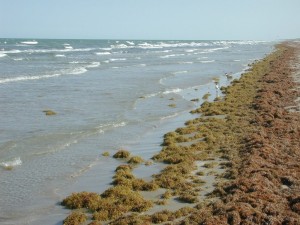 So, while we really haven’t had any oil on the beach so far–none at all, from what I can tell–it is seaweed season. Every year, huge blankets of sargasso seaweed drift into shore. The picture is of Padre Island National Seashore, but our little sandbar island looks much the same during seaweed season. Except a lot of mornings, the blanket of seaweed is thicker, and wider.
So, while we really haven’t had any oil on the beach so far–none at all, from what I can tell–it is seaweed season. Every year, huge blankets of sargasso seaweed drift into shore. The picture is of Padre Island National Seashore, but our little sandbar island looks much the same during seaweed season. Except a lot of mornings, the blanket of seaweed is thicker, and wider.
It’s perfectly natural. The seaweed is actually GOOD for the beach and part of the Gulf coast ecology, and it’s interesting to walk on (though you don’t want to much, because you can’t see what’s under it). It can be kind of stinky. Here, they tend to rake it up and pile it against the seawall to help anchor new sand dunes. Other places, I’m not sure they do that much.
Thing is, it’s kind of a red-brown color, once it washes ashore and dries out. Very similar in color to the red-brown oil they’re showing in the pictures on TV. Consequently, a number of folks in hotels along the beach would see the sargasso clumping up on the beach, and call downstairs in a panic to ask “What’s that stuff on the beach?!?!!” It’s seaweed. It belongs there. Just step over it, if you don’t like the crunchy, textury way it feels. It’ll be gone soon, and then it will be jellyfish season, and you’ll be missing the seaweed. (Yeah, the jellyfish come ashore after the seaweed mostly stops. It doesn’t really ever completely stop.) Still, when there’s a choice of oil on the beach, and seaweed–give me the seaweed!
I did get some pages written today. Not many. I’m going to join a 100-words-a-day group and try to get this dang book finishes.
]]>
I was here over the weekend, and it was wonderful. (This was Saturday, after the rain stopped–the view downriver from the upstairs deck.) We had workshops with a creativity coach who talked about recapturing the joy in writing, and how to be happily interrupted and other such things, plus there was time to write, and a concert, and white elephant gifting. Some of the white elephants were lovely. Some were…not so much.
The location was a house on an island in, I believe, the lower Colorado River. The only access to this island is by barge, or aerial tramway. It rained all day on Friday, the day we arrived, too wet, really, to cross on the barge. So we crossed on the tram.
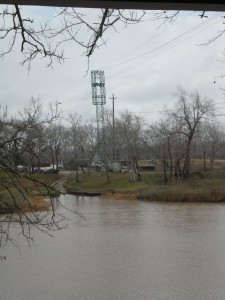 The tram was WAY up in the air! And it was small. The wind was blowing, and the car tilted sideways, and it swung back & forth when it crossed the towers (that’s the first tower in the picture–the barge landing is right below it, to the left). And I’m real nervous about heights. But I did okay. I did not scream and clutch at the handrails or cower on the floor. And I stopped shaking once we got on the ground.
The tram was WAY up in the air! And it was small. The wind was blowing, and the car tilted sideways, and it swung back & forth when it crossed the towers (that’s the first tower in the picture–the barge landing is right below it, to the left). And I’m real nervous about heights. But I did okay. I did not scream and clutch at the handrails or cower on the floor. And I stopped shaking once we got on the ground. 
It was just a wonderful weekend. Everyone brought potluck for meals, and we had WAY more than anyone could eat. We didn’t even open the ham someone brought.
My BFF Belinda came down from Waco with her fella, and they spent the night Thursday. Then Friday, in the pouring rain, we drove the “back way” down to the river house. We had to come a different way from everyone else, because the others were all coming down from Houston, and we had to just slide down the coast and come inland some from our island. Belinda and I drove in my “bus” and Ken followed us. In the rain. He likes to drive around and look at the country side. We were driving through flooded fields on both sides, lined with moss-draped trees. It was lovely. (Okay, the several junk yards we passed by weren’t so great, but…)
The only access between the downstairs “quiet” floor and the upstairs “brainstorming / workshop” floor was an outside staircase, so we got a little wet carrying things up and down. Mary (whose house it was) got REALLY wet, driving the golf cart to pick people up. She was so wonderful to open up the house to everyone, and work so hard to get everyone there.
B and I got there around noon, so we could just wallow in the experience, and wallow we did. Belinda had a one-on-one session with the coach. I did Tarot readings for at least half of those who came, including the coach. Some of them told me what their question was, and others didn’t, but they all said the readings were amazingly spot on. Well, one said she didn’t see some of the things, but… Anyway– I got a kick out of doing that.
Saturday night, Kathryn the coach, who is also a singer- songwriter, gave us a little concert with some wonderful songs. She did not bring enough CDs for everyone, and I don’t have mine yet. But let me tell you, the song LIVING WELL is a fabulous bluesy creation and You Need To Hear It. I fully expect to hear another of her songs performed by some bigtime country singer in the near future.
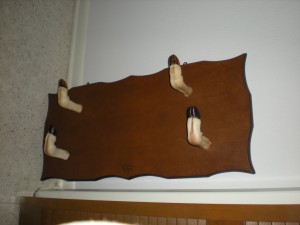 Then it was time for the white elephant. I didn’t get an elephant. I got a gun rack (for my (non-existent) rifle collection). Yes, those are deer hooves. Real ones. With fur and everything.
Then it was time for the white elephant. I didn’t get an elephant. I got a gun rack (for my (non-existent) rifle collection). Yes, those are deer hooves. Real ones. With fur and everything.
As you can see, I did bring it home. It’s going in the Lions’ Club white elephant Christmas party game this next year. 
I told my son to bring his friend Walter over to see it. Walter grew up on a farm/ranch outside Tyler, TX. I think he will appreciate it. (Yes, the picture is sideways, but the deer feet are the right way up.)
So now, it is time for me to run to the grocery store for ice cream and Cokes. (In Texas, all sodas are Cokes, whether they are Coca-Cola or not, but I really am going to by Coke Zeros.) And then pack my car and head off to the parents’.
I started rewriting a synopsis for White Elk, Red Sword while I was at the retreat. Mostly I was there to refresh and renew, but I did start on the synopsis. I finished it yesterday. So now I’m reading research books, and I hope to get back to work writing next week. I aim to get my head back into the story so I can do it.
]]>I got a great letter from my agent about my historical not-a-romance novel I sent her as a half-finished ms. She wants me to finish it asap. There are things I need to fix, and watch for as I write the rest of the book. I still have to do some research to get the ending right. It’s still a romantic adventure story, like pretty much everything else I’ve written, but it’s in an unusual-for-a-historical-novel time period and location, and it’s less romance. The main plot of the story isn’t a romance. So, I’ll write a synopsis and get the current partial out the door, then I’ll focus on Thunder in a Cloudless Sky.
I still have to bake cookies for my writer’s retreat. (Instead of “Retreat-a-thon” we should be calling it “Eat-a-Thon” given all the yummy goodies everybody is bringing.) And pack. Decide which book files I’m bringing. And figure out how to get everything waterproofed. This location is on an island. We can’t drive up to it. And the boat taking us over has no cover from rain. Rain is predicted all weekend. I may pack my clothes in an ice chest…
My friend B is coming in from Waco this afternoon, with her fella. We will go out for shrimps tonight. They’re like us. Want to eat shrimp whenever they get to the coast. I got no problem whatsoever with that!
Okay, heading home to get ready.
I know I just did two blogs in two days–I’m trying to work up to Two blogs a week, instead of just one–and I will try to space them out better in the future, but I haven’t made it yet. Y’all bear with me. 
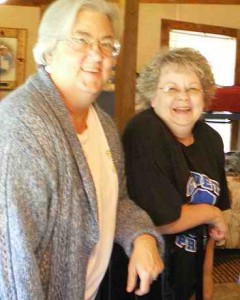
Or maybe it was a Treat for Writers.
I went on my annual pilgrimage to Valley Mills with my writer friends for the Heart of Texas writers’ retreat.
The place we go isn’t fancy. There are cobwebs in the rafters, and the floor slopes across the back room from the bathroom to the back door. There are 3 bunk beds, providing room for 6 to sleep, and a double bed at one end of the front room. (There’s a kitchen at the other end.) There is no heat unless you light the propane heater–and we didn’t light it. It got COLD that first night…but warmed up later. My friend Belinda and I went out a day early because we both had the day off. And it was wonderful.
There’d been a lot of rain lately, so the tank (man-made pond, for you non-Texans) right behind the cabin had water running into it, and out of it–into a pretty good-sized waterfall not too far away. Lots of limestone makes for lots of waterfalls. When there’s enough water to fall. This was the first time the tank’s been full enough to have a good-sized creek running out of it, and the water sang to us the whole time we were there.
We critiqued my synopsis (B came up with the perfect last line for it.) We wrote our morning pages. Belinda and I are going through The Artist’s Way by Julia Cameron together, and we were bad. We wrote our morning pages together, and we kept stopping to talk. It took us a couple of hours to finish. By the time we went into town for lunch and got back to the ranch, the other participants were starting to show up.
Friday night, we had 7 there by the time everyone got off work and came out. We ate sandwich for supper. (One great BIG sandwich in a ring, we cut into sections. We ate that sandwich a couple of days.) We critiqued the chapters of the people who sent them–four of us. We talked plot for the chapters we critiqued. I got too loud.
Four of us spent the night, one more came back around 10:30 a.m. And we did some writing drills–the ones where you take an assortment of items out of a bag and write a scene that includes all of the items. We plotted stories for me and another lady. B and I walked around the tank and down where we could see the waterfall from the front side. Sort of. Then we jumped the creek to get back. I took off my shoes and socks, in case I fell in. I didn’t have walking shoes, and I almost slid out of the backs of my clogs climbing the back side of that tank, because clogs don’t have backs.
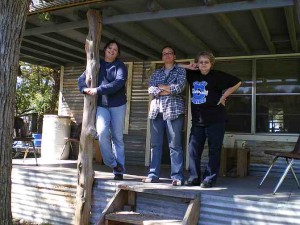 We spent some time writing on our own stuff. B and Diana (the middle person in this second picture–Belinda is on the right and Shelley on the left) went into town to get Diana some water, and brought back pizza for supper. After supper, we watched the movie “Twilight” and then analyzed its plot points. We used the plotting method from the Save the Cat book by Blake Snyder, and found it interesting that the main plot was the romance between Edward and Bella, and the subplot was the bad vampires. Most movies are the other way round. We talked writing until midnight or so, and it felt like we’d hardly got started.
We spent some time writing on our own stuff. B and Diana (the middle person in this second picture–Belinda is on the right and Shelley on the left) went into town to get Diana some water, and brought back pizza for supper. After supper, we watched the movie “Twilight” and then analyzed its plot points. We used the plotting method from the Save the Cat book by Blake Snyder, and found it interesting that the main plot was the romance between Edward and Bella, and the subplot was the bad vampires. Most movies are the other way round. We talked writing until midnight or so, and it felt like we’d hardly got started.
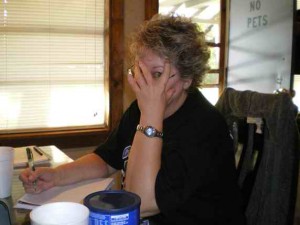 Of course, after sleeping 3 nights on those bunk beds– they weren’t bad, but they weren’t the best beds in the world either– we weren’t exactly looking our best. Belinda did not want her picture taken. I haven’t seen all the pictures taken of me. I’m hoping I can cut myself out of the worst ones… Yes, I forgot to take my camera. I forgot my sleeping bag–you think I’d remember my camera? (The beds had clean sheets and blankets that worked just fine.) I remembered all the critiques I’d printed out, and my notebook for the morning pages. The important stuff. (Also my toothbrush and blow dryer.)
Of course, after sleeping 3 nights on those bunk beds– they weren’t bad, but they weren’t the best beds in the world either– we weren’t exactly looking our best. Belinda did not want her picture taken. I haven’t seen all the pictures taken of me. I’m hoping I can cut myself out of the worst ones… Yes, I forgot to take my camera. I forgot my sleeping bag–you think I’d remember my camera? (The beds had clean sheets and blankets that worked just fine.) I remembered all the critiques I’d printed out, and my notebook for the morning pages. The important stuff. (Also my toothbrush and blow dryer.)
Sunday, we got up and did some other exercises, then cleaned up, threw away our trash, divvied up the remaining groceries (I got the Fritos, a package of bagels and the blueberry cream cheese), hugged everybody good bye and went home again. We’re going to try to do this again in the spring, so we can have a spring and a fall retreat, more than just once a year.
So now my synopsis is fixed, my partial’s been critiqued, and I’m printing it out to send off to the agent. I really like retreating… 
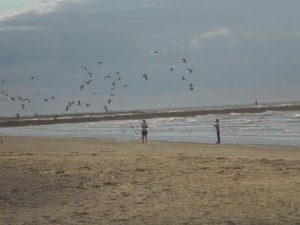
Okay. So, I went walking out by the water today. It was a rather surfy morning with lots of wind and birds (royal tern, snowy egret, cormorants, pelicans, willets, first ring-beaked gull of the season, as well as herds and flocks of laughing gulls), and I saw these ladies feeding the gulls.
As I walked nearer, more gulls arrived. They were flying over from–from miles away, or it seemed like it. The gulls already present didn’t seem to be making much noise. No cries other than the usual, from what I could tell, and not many of those. And I decided that seagulls must have telepathy.
There must be some extrasensory sense they use to tell each other when somebody’s throwing food. Because there might be One seagull when the first breadcrumb gets pitched, and dozens mass out of nowhere to fight over it.
I’m pretty sure these ladies aren’t local. Most of the locals are not fond of seagulls. They’re too much of a nuisance to want to feed them. There are a few locals who will feed seagulls. The matriarch of a local restaurant kingdom used to feed the seagulls from the balcony of the hotel next to their flagship restaurant. There’s a statue in the restaurant of her, or someone, feeding gulls. There’s a story going round (I don’t know how true it is) that she died falling from the balcony while feeding the gulls. But let’s leave that depressing digression and return to my next thought.
Which was: Which is the worst nuisance? Pigeons, grackles or seagulls?
They are all known for gathering in great swarms. They are all known for pooping on everything in range. Frequently, with great disgustingness and stench. But which one is the worst of the sky rats?
My vote goes to grackles.
Seagulls? They’re stuck by large bodies of water. They have webbed feet , so they can’t sit in trees and poop on the cars parked under them. (Take note, director of 300 where a seagull sits on a spear–not possible. Webbed feet can’t grasp a spear!) Their cries aren’t that annoying. Laughing gulls have a lower pitched cry than other gulls, so it’s less annoying than those others. They’re also smaller birds, as gulls go, so they don’t poop as much as the big herring gulls. Also, I haven’t seen them sitting on the beach in groups larger than, oh, maybe 30 or so. Mostly less.
Pigeons have a wide range. We have pigeons on the beaches. Sometimes. They do sit in trees and on statues and stuff, and I think there may be a pigeon ESP as well, because they seem to gather instantly when somebody starts throwing bread crumbs. But they don’t seem to gather in flocks as large as the grackles. Also, they’re edible. And they coo. Nice, soft, cuddly-sounding coos.
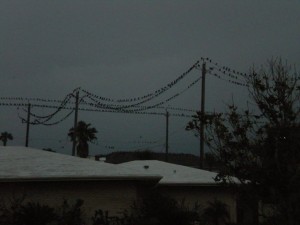 Grackles? They’re as big as pigeons, beak to tail, but they’re skinny. No meat on their bones. And they collect in flocks that can take over whole city parks. Thousands of birds. We took this picture in February/March (around Mardi Gras). The power lines are not that thick. There are birds along every line, and they’re all over the lines across the street, and along the rooflines, and in the trees (there aren’t many) and Everywhere. Massive, Alfred-Hitchcock-worthy flocks.
Grackles? They’re as big as pigeons, beak to tail, but they’re skinny. No meat on their bones. And they collect in flocks that can take over whole city parks. Thousands of birds. We took this picture in February/March (around Mardi Gras). The power lines are not that thick. There are birds along every line, and they’re all over the lines across the street, and along the rooflines, and in the trees (there aren’t many) and Everywhere. Massive, Alfred-Hitchcock-worthy flocks.
Besides all the pooping and gathering and flocking, grackles do not coo. They do not tweet or chirp or cheep. They Screech. Like nails on a blackboard. Literally. And they clack. Sort of like a 3 Stooges “Nyuk, nyuk, nyuk,” but louder. And more clacky. And then they screech again. Endlessly. Back and forth at each other in their ginormous flocks.
If I have to have grackles, or pigeons, or seagulls, I will take seagulls. If I can’t have seagulls, I’ll take pigeons. If only I do not have to deal with grackles. Unfortunately, on the island, we have all three. Sigh.
 Oh. I took a picture of a little sand crab too. It was very cool. I almost didn’t see it, it’s so tiny, and so close to the same color as the sand. Can you see it in the middle of the picture? It’s casting a pretty big shadow. The whole thing, from one end of its little legs to the other, is about the size of my thumb, to give you a size comparison. I only spotted it (and the other, smaller one I saw) because they were running across the sand. Back to their holes, maybe.
Oh. I took a picture of a little sand crab too. It was very cool. I almost didn’t see it, it’s so tiny, and so close to the same color as the sand. Can you see it in the middle of the picture? It’s casting a pretty big shadow. The whole thing, from one end of its little legs to the other, is about the size of my thumb, to give you a size comparison. I only spotted it (and the other, smaller one I saw) because they were running across the sand. Back to their holes, maybe.
I did write today. I got all the way to the end of the action in the synopsis. I now need to write the emotional denouement. I am not sure what it will be. I also pretty much left all the romance plot out of the synopsis. I’m trying to lean harder to one way or the other in SF or romance. I do pretty much half and half, most of the time. I can write the romance in the story, but I’m having trouble writing it into the synopsis. It’s like–the romance happens while they’re doing this other stuff. We’ll see how it works. Maybe this story is the other way round. Ah well.
So–what’s your vote? Grackles? Pigeons? Seagulls? Which is the worst nuisance???
]]>Part of that, I think, is because I’m a very fast reader. The other part, however, has to do with–I think–the fact that I honestly don’t have any idea how I write. I’m not a very structural writer. More intuitive.
No, I do not sit down and just write. I have to have a semblance of a plot outline before I can really jump into the story and get where I want to go. I think this is because I am so VERY disorganized and–well, intuitive–in the way I write, that if I don’t have that minimal amount of structure–a road map, or point-to-point guide–I can’t get anywhere.
But when I’m reading my own stuff, I don’t necessarily know what’s wrong with it. I can usually tell when something’s reading slow, and I need to thin it out. Or cut it entirely. But I’m not real good at analyzing scenes–especially when I’m in the middle of writing them. I just write what feels like needs to be there.
It’s possible I’m more analytical than I realize I am. I do remember writing dialogue scenes and having to stop and go back, because I didn’t get some information in that I wanted revealed, or the characters didn’t say what I wanted them to say. Sometimes, I stop and rearrange all the dialogue, because it doesn’t lead logically from one thought to another. (dialogue doesn’t always, but I do try to keep the non-sequiturs to a minimum.) And sometimes, I cut stuff out, because Somebody already said that once. Or twice. And yes, this happens on the first draft through.
Anyway, I think this relates to my ability to still read as a reader. Sometimes I stumble over things–misused words, or historical anachronisms–but if it’s a good story, it’s not much of a stumble. I keep flying through. Then at the end of the book, I have to stop and think “Okay, what did I really think about that book.” Because sometimes, I reach the end with the feeling that something is just a bit off, or maybe a lot off, and I have to think about why.
I’m in the middle of a book right now, which I have been enjoying less and less as i’ve gotten deeper into it, and I can tell you exactly why. It’s depressing. In the beginning of the book I was willing to give the characters some slack, if they were maybe a little too mean, too callous, too selfish to really like them. There were other, more likeable characters to follow. But then the author killed off the decent characters, had others fall apart, let the roguish character go a little too roguish, and let the bad guys loose to be really, really bad.
I know he’s doing the “dark before the dawn” thing–but I’m only on about p. 1782 (out of 3345–it’s on my Sony reader, and I have the print turned up to medium-this is a really LoNG book), and there’s a lot of dark ahead of me, and there’s only one character left I even sort of like. I’m not sure I have enough reason to finish it. Especially since it’s science fiction, and thus no happy ending guaranteed.
This is why I read, and write romance. Because the characters are likable, and there’s a happy ending.
]]>
Seawall mural is looking sadly bedraggled since Ike. Wonder if they’d like volunteers to try to spruce it up…
Anyway. I have taken to checking in at Twitter, and clicking on all the referrals to articles & such until I have a whole row of tabs across the top of my Firefox. And when I have a minute more, I read them all. And now I can’t remember which one I read that made me think.
It was an interview with Ron Charles, who is an editor and book critic with the Washington Post and just won an award. He sounded like a fascinating man (especially since they have been trying to find a Romance novel reviewer who doesn’t write things like “If you like this kind of crap…”), and I found the interview interesting. But there was one thing that tweaked a few thoughts. I’ve thought this before, but I don’t know that I’ve blogged about it before. If I have, and you read it, forgive me, and skip down to the beach report.
He mentioned how he tried to be respectful of the fact that the novelist might have poured the past 8 years of his or her life onto the book when he reviewed it. And I got to thinking about a writer’s pace of writing.
There are a lot of folks out there who think that a book more slowly written must inevitably be a better book than one written quickly, all subjectivity set aside. I do not agree. Furthermore, I have a sneaking suspicion that if a person takes 8 years to finish a book? They were doing a whole lot of other stuff (most likely a day job) while they were writing that book.
I have a book I’m working on that I have been working on since, oh–1981, or earlier. I’m still not finished with it. But I have not been writing on the book every day of that time. I decided, back in ’81 or so, that I did not have the craft and skills to write the book at that time, since it had a complicated plot, would have to be told in flashback, and had a difficult character to write. So I set it aside for about 20 years.
In the intervening time, I have written 5 or 6 books which will never see the light of day. I have written 8 more, which have or will be published by various publishers. It’s not like I haven’t been writing. I just haven’t been actively writing on THAT book.
If I count only the time in which I have been actually writing and researching Thunder in a Cloudless Sky (working title), I’ve probably been working on it 6 or 7 months.
I don’t consider myself a fast writer. I can’t whip out a draft in a week. Or even 2 weeks. Or a month. But. I do write an average of 6 pages a day, which is faster than the 1 page a day book in a year that some writers manage. And I don’t write multiple drafts. My first draft is pretty darn close to the final version. I might add a scene. More likely I’ve cut several scenes (I tend to write long.) and reworked it to smooth things out. I’ve probably cut and smoothed some dialogue. Corrected grammar and typos. Fixed inconsistencies here and there–like changing eye-color, or minor character names. And that’s about it. I prefer the “all at once” method.
Still, despite all that, it does not take me 8 years to write a book. Even Thunder, which is a huge book, will not actually take me that much time to write. I posted here last week: it took me 10 weeks, 2-1/2 months, to write 450 pages. And I don’t even spend all day writing. I do my composing/drafting in the mornings, then I do other stuff–PR, e-mails, blogging, etc.–in the afternoon. I do it this way because I have found that I tend to fall asleep over the desk if I try to draft in the afternoon. I just have a sinking spell, as my Great Aunt Jessie put it, about that time. So I get those 6 pages written in half a day.
Other award winning authors write faster than I do. Some write slower. The thing is–how you write is how you write. Faster does not necessarily equal better. Nor does slower. Working eight years on a book (or six, as in Dan Brown & The Lost Symbol) does not mean it’s going to be a masterpiece. It might be a darn good read. But it might not.
Personally, I think I write better when I write faster, because I keep my head in the story. I’m more immersed in the story world. I do not think about it all the time. I think it’s better to shove everything back into the swamp where my stories live, and ignore them, until it’s time to pull things out again to go to work. The swamp does a better job, most times, of letting the right stuff bubble up when I need it than if I actively think about it. I might think a little bit if I’m working morning pages a la The Artist’s Way, but mostly, I don’t. The subconscious is smarter than I am about a lot of things.
In the end, I am still skeptical of those people who claim to write full time for years to produce a single book. I just find it hard to believe they’re writing all that time. If I took six years–or five, or two–or even one–to write a book, you can bet that a whole lot of that time would be spent doing other stuff.
I’m not saying it’s wrong to write slowly. Your process is your process, just like mine is the weird thing it is. I just have trouble comprehending what they’re doing with all that time…
Because, you know, if you write just one page a day, at the end of a year, you have enough pages for a book. I wrote a whole hour & a half today, and got TWO pages. And they were synopsis pages, which, as we all know, counts the same as Four pages of story, because it’s twice as hard to write a synopsis…
Beach report: Yep, went out to the beach to walk. Went late, at 9 a.m. instead of 8. Sun was bright and hot, humidity is heavy enough to make the windows of my house sweat all day. Temp about 82 F/28 C, but it felt hotter because of the sun & humidity. The water was pretty surfy today. More waves than we’ve had lately, white water all the way out past the jetties. The seafoam was white. When I went out Saturday, it was kind of greenish. Weird.
It was still a nice walk. I found a big, pretty shell. Will try to remember to take a pic of it soon. Met a cute little dog. (Did Not take Dolly.) Not many birds out that late, but lots of little crabs were digging the sand out of their holes. Didn’t see any cool crab footprints though…
Better go put food on to cook.
]]>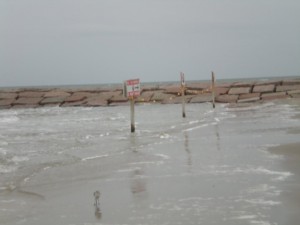 The princess wussy dog and I went for a walk this a.m. She makes me walk faster, so I get more out of it. I intended just to walk on the seawall (I have to wear actual shoes when I’m walking with her from the house–too far in flipflops) but she was a good dog–didn’t bother any of the people while we were out walking, and she kept looking over the edge of the seawall. She hasn’t jumped off since that first time. I imagine the 10-12 foot drop gave her pause. So we went down the stairs and walked back along the water. She was very good then too–did not slip her collar to chase birds and did not upset the small children by going too close. It was a beautiful morning for a walk, cool & breezy. (Cool for Galveston = hot for many other places. It’s probably 80F/27C) I threw in this picture of the “Do Not Swim Too Close To the Jetties” signs because I thought they looked festive with their red and yellow floats on the ropes–but you can’t really see them in the picture. Oh well.
The princess wussy dog and I went for a walk this a.m. She makes me walk faster, so I get more out of it. I intended just to walk on the seawall (I have to wear actual shoes when I’m walking with her from the house–too far in flipflops) but she was a good dog–didn’t bother any of the people while we were out walking, and she kept looking over the edge of the seawall. She hasn’t jumped off since that first time. I imagine the 10-12 foot drop gave her pause. So we went down the stairs and walked back along the water. She was very good then too–did not slip her collar to chase birds and did not upset the small children by going too close. It was a beautiful morning for a walk, cool & breezy. (Cool for Galveston = hot for many other places. It’s probably 80F/27C) I threw in this picture of the “Do Not Swim Too Close To the Jetties” signs because I thought they looked festive with their red and yellow floats on the ropes–but you can’t really see them in the picture. Oh well.
Walking on the beach is one of the things I really enjoy about living here. We can walk from the house (which we never do with the grandkids, because we don’t want them to know just how close it is), or drive up and save the walking up time for beach time. I was going to use that as a segue from talking about my beach walk to talking about lifelines in writing–but I can’t figure out quite how to do it. Except that writers have to do non writing things to “fill the well” that the writing comes out of, and walking on the beach is one of the things I do.
Now, I am going to talk about those Lifelines mentioned by Ali Hale. She talked about how lifelines are other people who keep the writer honest. They keep us writing and working toward the goal of finishing a longer work, so that we keep writing those 10 pages a day, or 6 pages, or 2 pages. (There have been times that I struggled just to get a half page written.)
She mentioned writing critique groups, online or in person. And critique groups are great. I belonged to a fabulous group in Waco about 15 years ago, before I moved away from the area. Of the first 5 members, four of us have been published. I do believe in critique groups. The problem is, not everybody can find one where they live. I moved from my small town near Waco (I lived about 30-45 miles (48-73 km) out of town) to an even smaller town in the Texas panhandle, about 60 m (97 km) from Amarillo, the nearest city. No critique groups available. There are online crit groups that work very well for some people. I’ve never been able to make them work for me, because so far, nobody in any group I’ve tried to participate with has been consistent in either critiquing or writing. Which kind of defeats the purpose of a lifeline.
See, a lifeline is a form of accountability for those deadlines. When you set your own deadlines, there’s no penalty if you don’t make them, except maybe guilt, and getting down on yourself. However, if you’re producing 10 pages a week for your crit group, and they expect those 10 pages, (we met every other week, and shared 20 pages each time) you work harder to get them done.
That said, a critique group, for all that I love them and would love to have one again, is not the only kind of lifeline there is. The past 3 years, I have had a Goals Coach.
Back in 2006 I took an online class by Gwen Shuster-Haynes on creating a writing career plan for introverts and extroverts through the Kiss of Death mystery/suspense chapter of Romance Writers of America. I got a lot out of this class–I took it, I think, just before my publication contract with the LUNA imprint of Harlequin got canceled, and it really helped me organize myself and keep moving forward. Anyway, one of the things I got was the idea of a goals or career coach.
How this works, or how it’s worked for me, is that I teamed up with another person, we wrote down our goals for the week every Monday (or as close to Monday as I could manage), e-mailed them to each other, and then the next Monday, when we e-mailed our next set of goals, checked off what we managed to get done in the last week’s goals. My first Coach was Shari Bouillion, (I may have added or left out an I in there) who insisted we work out yearly and quarterly goals with dates. (I tend to be real wishy-washy about dates.) And that we include family, work, writing, and spiritual/personal goals. It’s obvious she was MUCH better at this goals coaching thing than I am. We coached each other for over a year, and her life got so complicated, she had to drop out.
I was bereft! I still wrote up my goals every week, and printed them out and stood them up on my lamp where I can see them if I ever get stuck with what else I need to do, but it’s not the same if you don’t have somebody to be a bit of a nudge. I limped along on my own for a while, when on an e-mail loop I’m on, someone asked about how to keep going through the end. So I did my goals coach pitch on the loop, and asked if anyone was interested, and now we have a 3-way goals coaching group going between myself, Natasha Moore who writes for Red Sage Publishing, and Carol Stephenson, who is one of those right on the verge of publication, that last frustrating phase before you finally make it over that final hump.
Natasha has very short goals lists. She confines hers to just writing. Carol prioritizes hers. She has a Must Finish section–which are not all writing goals–and a Priority 2 section which is “If I have Time & Energy.” I put all my goals in one long list, but the ones at the top of the list are top priority, and the ones at the bottom are lower. (I need to move “Exercise” higher on the list!) And it’s time to nag them (though usually it’s Carol that does it) to post some goals for the last quarter of the year.
We don’t critique. We all write Very different things. We write at different paces. Sometimes, we don’t post any goals for a week or two. I tend to disappear when we have company (friends & family love to come visit us at the beach). Carol moved house a while back and is still dealing with that. Natasha goes on RV trips. (Jealous!) But we come back when we need to, because it’s a way of keeping ourselves on track.
It seems to work best in a smaller group. We could probably add one or two more, but I don’t know that I’d go higher than four.
So. There you have it–another kind of lifeline for writers to stay on track. If you have a critique group that’s working for you, great! But if you don’t, you might try finding one or two other people who can help keep you on track by exchanging weekly goals.
]]>